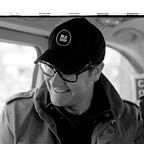What Are the New American Stories?
We got on an old rocker’s tour bus and went around America to find out
America is at a crossroads. Duh. We’ve been here before, about every 25 years or so. My Uncle Joe is a logger, and is a font of wisdom including: “We’ve forgotten who the boss is in America. The citizens are the boss!” Alexis de Tocqueville would be proud to hear this and saw the same spirit in the 1800s when he journeyed from town to town along the East Coast, yet he would also likely be pretty worried about America today. Were he alive, Tocqueville might also brand himself a guru of America and charge $50K per speech, and demand a private jet — that’s kind of where things are right now.
Anyhow, there’s actually a lot of good news beneath the droning “Biff for President” drum beat (oh, wait, that wasn’t in Back to the Future?). I say this after being part of a bus tour to 18 cities and towns in America on what can only be described an old 1980s “glitter bus” in the middle of America earlier this year. We were promised Willie Nelson’s old bus, but after that one broke down, we ended up with Barbara Mandrell’s bus, a country singer I hadn’t heard of before the tour, and whose old tour bus has more mirrors than Versailles. (If the mirrors could only talk.)
Here’s an obvious point: America is often deeply disconnected today. If you’re like me and live on the coasts and don’t get out much, it’s basically impossible to understand what life is like in rural America, where a heroin epidemic is destroying lives and families at a lightning pace. Meanwhile, from Oakland to Ferguson to Pittsburgh to Kansas City, black Americans feel such a state of hopelessness and despair by generations of stagnation, and constant fear of being in their own communities, that they have adopted the “Black Lives Matter” slogan. That’s not the promise of America that I grew up studying and believing in.
It seems to me that at the end of the day, most Americans feel completely powerless today, so much so that a sense of helplessness has set in. No one likes that feeling, and the result is understandably often anger and pain. What most Americans need desperately right now is to feel that (a) their country isn’t lost to billionaires and corruption, (b) they actually have a voice and can be heard, and (c) they themselves can be a small part of the creative solutions — what the musician Aloe Blacc calls “having your own small patch of lawn.”
Isn’t this about the time when Bill Murray should enter all of our living rooms to give us all our marching orders? Bill, we need you. Like, now.
Despite all of our technology advances, few would dispute that there’s a lack of humanity in America today. There aren’t places for Uncle Joe to connect with black activists like DeRay Mckesson (@deray). Our social media feeds are segregated, just like most of our social interactions. And, those divisions are fed in the national media, sometimes for ratings, or often by what Lenny Mendonca calls “the political industrial complex” — a multi-billion dollar a year industry driven by pollsters and quantitative geeks looking for ways to create contrasts and divides that can be exploited for their own gains.
Encouragingly, people are cutting their cable cords and unplugging from the nauseating manufactured narratives in spades. We saw this on the bus tour around large swaths of America and on visits to 18 cities and towns. The Americans we met and spent time with were reinventing themselves, their companies, and their communities — from New Orleans to Tulsa to Detroit to Louisville — and it was nothing short of inspirational. We found countless Americans putting their communities over themselves, and were blown away by the generosity of spirit we encountered.
If only CNN or the major networks got out of their offices in NYC and LA more and covered America from the bottom up, the narratives we get fed might be a lot different. We took this gap as a challenge, to help share voices and stories that could be part of the solutions, rather than the problem.
Our group on the bus were a motley crew of misfits ranging from writers to entrepreneurs to artists. Since 2011, we’ve called ourselves the BLK SHP (black sheep), which was inspired by Pixar where they call people black sheep who are “the artists [at Pixar] who think differently, and have a different way of doing things.” (If you’re a black sheep at Pixar, that’s pretty badass, so we made hats and shirts, everyone wanted one, and here we are). Today, our community has grown to over 3,000 creative thinkers and doers. Anyhow, here is a short film sample from our tour by our film team (Patrick Bresnan and Ivete Lucas, now Sundance filmmakers, wohoo!) to give a feel for what we learned, and how we were inspired.
As a next step, and towards the goal of building towards both greater empathy, and so that BLK SHP can act as a “connective tissue” across traditional boundaries toward collaborative action, we are working to develop a episodic docu-series to help show and share these “New American Stories.” We’re looking for distribution partners and collaborators, and while we’re talking with some big names like PBS and CNN, we’re totally open as to how this unfolds. If you want to get involved, we’d love to find ways to conspire.
After all, the revolution will be improvised.
